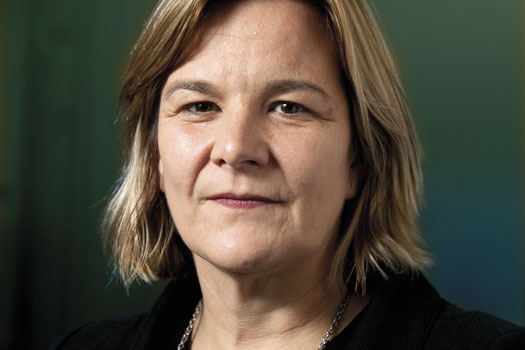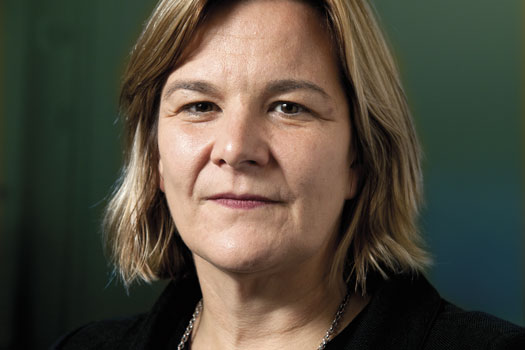‘We want the CQC to be seen as a critical friend’


Pulse: Almost one in five practices rated ‘good’ by the CQC has deteriorated in the past year. How far is that being caused by the pressures facing GPs?
Dr Rosie Benneyworth: We’re seeing ‘inadequate’ and ‘requires improvement’ practices improving but we are seeing some deterioration in those rated ‘good’ and ‘outstanding’.
That’s due to a variety of factors. First, there is likely to be a definite impact from the increase in system demand, the increase in demand on practices, the lack of joined-up care. Second, I think some of the changes we see in practices are due to a change in leadership. So sometimes we find deterioration can be due to a change in practice manager, or in GPs and the effect that can have.
It’s really important practices that are merging or taking over other practices really understand the impact of that and the importance of continuing to focus on quality while going through that change.
Some people might think, ‘Oh, just bring two practices together and it will all work’, yet we can’t underestimate how difficult bringing two different cultures together can be, and the change that can have and impact on the quality of care that practice is able to deliver.
In 2015, at the time of the first set of practice inspection results, your predecessor Professor Steve Field said general practice had ‘failed as a profession’. Do you agree?
We know 95% of general practice is ‘good’ or ‘outstanding’, and we know GPs are working incredibly hard. We know there’s huge demand on general practice and the demands are increasing.
We know a very small proportion of practices are struggling and we are keen to work with our local partner agencies, such as CCGs and NHS England, to look at how we can ensure those practices get the support they need. We also know that a lot of the demands placed on general practice come because the system as a whole across health and care is not working together to provide joined-up care. For example, I know as a GP that if you can’t get a patient timely access to mental health care, that can cause a huge problem for you clinically, because you can’t do the right thing for the person in front of you, and also adds to the pressure on your day.
Where I’d like to get to is that we are seen as part of the solution to practices improving, we’re able to be seen as a critical friend who goes in, who can put a mirror up to the practice and help it identify the priorities for improvement.
In the light of the pressure on GPs acknowledged in the CQC’s latest State of care report1, and the stress practices say is caused by CQC visits, will you change the approach to inspection in the future?
We’re not going to be making concessions. Ultimately our purpose is to ensure patients get high-quality and safe care, and we know practices are under huge demand and that’s making it very challenging.
But we are seeing different practices in different parts of the country really address those challenges by remodelling what they’re doing, working in conjunction with partner agencies across the local area, thinking about their population’s needs.
What we do does lead to much more rapid improvement
We need to make sure every part of the system works much more closely together… because we know that if any parts are not working well, it can have a significant impact on other providers. I know that as a GP I used to get a lot of phone calls from a specific care home that was having some issues and that put quite a significant demand on the practice.
We are very clear in our State of care report for 2018/19 that we want to congratulate people working in the health and care setting because we know that quality is essentially maintained [in many services] despite all the challenges.
What evidence is there that the CQC’s inspections lead to safer GP services?
For many years I’ve tried a variety of ways of improving care for patients, be it through commissioning or working in collaboration – such as transformation programmes and patient collaboratives – and one of the things I have noticed in the short time I’ve been in this role is that what we do does lead to much more rapid improvement.
We have numerous examples where we go into practices, we raise the issues that we see, and we go back to check how they’re doing a few months later and see the improvement they have made.
Earlier this year the CQC launched a campaign encouraging patients to complain about healthcare services to improve them. How far can GPs trust the CQC to support them?
I would hope that practices are looking anyway at getting patient feedback on what they do. One element of quality is patient experience and unless we ask patients what that is like, we’re not sure about the quality of care we’re delivering.
We form our judgements on any of our providers using a variety of information that we get. Some of that is quantitative data and some is things like QOF data and immunisation rates.
But some of it is about the feedback we get…We’ve had too many examples over the years, with Mid Staffs and other similar examples, where patients have come to harm, which really highlight the importance of people being able to raise concerns. We’re in a position where we can collect that feedback – positive and negative – and use that in conjunction with the other information that we get to form a judgment and to support a practice by understanding what that feedback is.
Part of that is being able to give practices the information that will enable them to make improvements to how they’re doing things and continue to understand how they need to develop.
The CQC is reducing the frequency of inspections for ‘good’ and ‘outstanding’ practices by carrying out annual phone interviews. Has this approach been successful?
We’ve heard a lot of positives about that phone call… a lot of the feedback we’ve had from our stakeholders has been that it started to help build those relationships between inspector and practice.
It started to enable our inspectors to have a much better understanding of the context and the changes that are happening within the local area and within the practice. And it’s hopefully going to break down some of those barriers between the CQC and practices going forward.
How can primary care networks (PCNs) help to reduce the high workloads GPs are facing?
I think networks are a huge opportunity to look at how we can stabilise some of the workforce issues in primary care. So, by looking at different skill mixes, by working with lots of different professionals within networks, I think there’s an opportunity to bring in a broader range of skills and look how they work together as part of a multidisciplinary team.
I also think there’s a real opportunity with networks to understand their population… and to start to build those relationships with local organisations, such as voluntary services, community services and mental health services.
Will networks create an additional level of risk for GPs, who are expected to hire more multiprofessional staff?
I think it is going to be important that we don’t get into situations where people are working outside what they’re competent to do, that people do have correct supervision and training. But provided there is clear thinking and clear arrangements in place, I think there will be no additional risk compared with the multidisciplinary working we’re [already] seeing.
How far will networks create an extra layer of CQC inspection for GPs?
I’m keen to make sure networks really consider governance arrangements for services from an early stage and think about who is really accountable – particularly with professionals working across different practices and delivering services.
We will be regulating legal entities, so at the moment that will not change in terms of practices and how they’re registered with us. The only caveat would be if PCNs set up legal structures to be able to deliver some of the services that are going to be required through the new contracts.
We certainly don’t want to create any additional layers of regulation for networks
For example, if a group of practices formed a federation-like structure that was going to deliver extended hours… we would have to consider whether we needed to register them as a separate legal entity.
We certainly don’t want to add additional layers of regulation, we want to make sure it’s as streamlined and as proportionate as possible.
CV
Age 45
Education
• 1992-1997 Graduated with Bachelor of Medicine Bachelor of Surgery, University of Nottingham
Career
• 2001-present Principal, locum, salaried GP in various locations
• March 2019- present Chief inspector of primary and integrated care, CQC
• 2017-present Trustee, Nuffield Trust
• 2017 -2019 Director of strategic clinical services transformation, NHS Somerset CCG
• 2016-2019 Vice-chair, NICE
• 2015-2017 Managing director, South West Academic Health Science Network
Other interests
Rosie has two teenage boys to keep her busy as well as enjoying, running, swimming, singing and walking with her two dogs
Pulse July survey
Take our July 2025 survey to potentially win £1.000 worth of tokens












